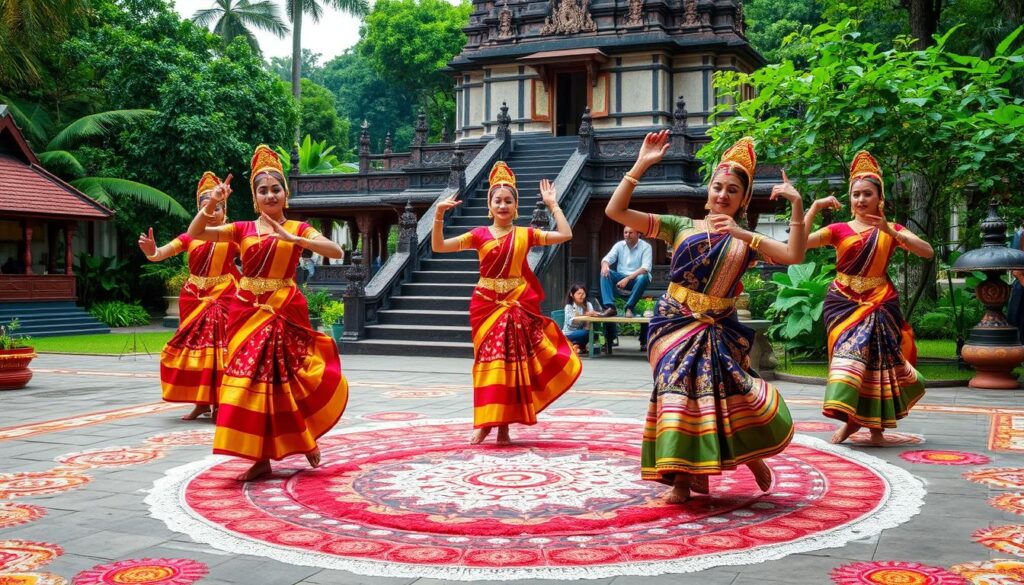Anura Kumara Dissanayake Wins Sri Lankan Presidency 2024
In a decisive moment, Anura Kumara Dissanayake was elected President of Sri Lanka after the 2024 elections. This win signifies a big change in politics and starts a new era in the country’s rule. Being the leader of the National People’s Power and Janatha Vimukthi Peramuna (JVP), Dissanayake’s win highlights the power of people’s voices in shaping leadership.
When votes were first counted, Dissanayake gained 42.31% of them. Adding second preference votes confirmed his win. This move was new for Sri Lanka and cemented the Anura Kumara Dissanayake Victory. It shows a big Political Shift 2024 and draws global attention for its impact on democracy and regional politics.
Dissanayake plans to fight corruption and push for growth. He faces the big tasks of reducing poverty and boosting the economy. His coalition’s big election promises reflect their commitment to trust and integrity. This focus is key in today’s Political News in Sri Lanka.
Key Takeaways
- Anura Kumara Dissanayake emerges victorious in the monumental 2024 Government Elections of Sri Lanka.
- The requirement to count second preference votes underscored the legitimacy and broad-based support for Dissanayake’s administration.
- The victory of Anura Kumara Dissanayake represents a major deviation from traditional political structures.
- An emphasis on anti-corruption measures and economic reforms was pivotal to garnering public consensus.
- Sri Lanka anticipates a period of political stability and policy consistency as Dissanayake sets forth his administrative agenda.
- The forthcoming general elections will be crucial in solidifying the administrative bearing and fulfilling the electorate’s expectations.
Anura Kumara Dissanayake’s Historical Victory: Sri Lanka Embarks on a New Political Era
In 2024, Anura Kumara Dissanayake celebrated a major victory in Sri Lanka. He became the President with the support of the National People’s Power coalition. His rise to power shows a big shift in the country’s politics. It echoes the people’s desire for real change.
The Emergence of National People’s Power Coalition
The National People’s Power coalition has brought fresh energy to Sri Lanka’s political scene. It grows from the efforts of the Janatha Vimukthi Peramuna (JVP) and unites several left-leaning groups. They aim to tackle important socio-economic challenges. This coalition came together to bring about needed reforms and better governance, especially during tough economic times. You can learn more about Sri Lanka’s situation here.
From Minority Representation to Executive Presidency
Once, Dissanayake headed a small party with just three parliamentary seats. Now, he’s President, a drastic transition. He got 42% of the first-choice votes, showing broad public backing with over 5.7 million votes. This victory broke the hold of two major parties on Sri Lankan politics. It opens the door for meaningful reforms aimed at making the government more transparent and accountable.
Unprecedented Use of Second Preference Votes
The 2024 presidential race saw a key role for second choice votes in Dissanayake’s win. After securing 42.31% initially, these additional votes helped him win a slim majority. This strategy shows how his call for change won wide approval from voters.
| Election Details | Initial Votes (%) | Result after Second Preference Votes |
|---|---|---|
| Anura Kumara Dissanayake 2024 | 42.31 | Majority Win |
Dissanayake’s win ushers in a new era in Sri Lankan politics with the National People’s Power coalition at the helm. It signifies a deep political awakening and the people’s strong wish for change.
Anura Kumara Dissanayake Elected President in 2024, Marking Political Shift
In 2024, Anura Kumara Dissanayake won the Sri Lankan Presidency. His win means a big change in politics. He wants to fix old political ways. His victory starts a new chapter for Sri Lanka. It promises better governance and a fight against corruption.
Breaking Free from Traditional Party Dominance
Anura Kumara Dissanayake’s win signals a new phase in Sri Lankan politics. He got 44% of the vote, beating Sajith Premadasa who got 34%. This shows people want change. They are tired of the usual two-party system.
Promise of Good Governance and Anti-Corruption Initiatives
Dissanayake’s government aims to boost Good Governance. People are worried about corruption. His plans to fight corruption won many votes. This aims for a transparent and responsible presidency.
International Reactions and Future Collaborations
The world is optimistic about Dissanayake’s presidency. Neighboring leaders, including India’s Prime Minister, are ready to work with Sri Lanka. This could mean better regional teamwork. They are also open to looking at important deals again. This includes a US$2.9-billion deal with the IMF. This shows Sri Lanka is eager to improve its global standing.
| Year | Voter Turnout | Percentage Vote for Dissanayake | Runner-up Vote Percentage |
|---|---|---|---|
| 2024 | 76% | 44% | 34% |
| 2019 | 83% | N/A | N/A |
This election is a key moment for Sri Lanka. It’s not just a political change. It also aims to improve governance and global relations. All under Anura Kumara Dissanayake’s leadership.
Implications for Sri Lanka: Challenges and Expectations for President Dissanayake
Anura Kumara Dissanayake’s presidency in 2024 signals a new chapter for Sri Lanka. His election puts the spotlight on how he plans to tackle major issues. Economic Recovery, Poverty Relief, and dealings with the International Monetary Fund are top priorities. People expect him to improve the economy and make life better for everyone.
As leader of the National People’s Power coalition, President Dissanayake faces several tasks. He needs to develop policies that help the economy right away. Boosting business, attracting foreign investment, and restoring public trust are essential. His work with the International Monetary Fund is a chance to make financial terms fairer for the needy.
President Dissanayake also has to ensure political stability. With elections coming on November 14, it’s vital to have strong legislative support. Achieving economic goals and keeping good governance are crucial. Everyone wants a government that can bring progress and fairness.



